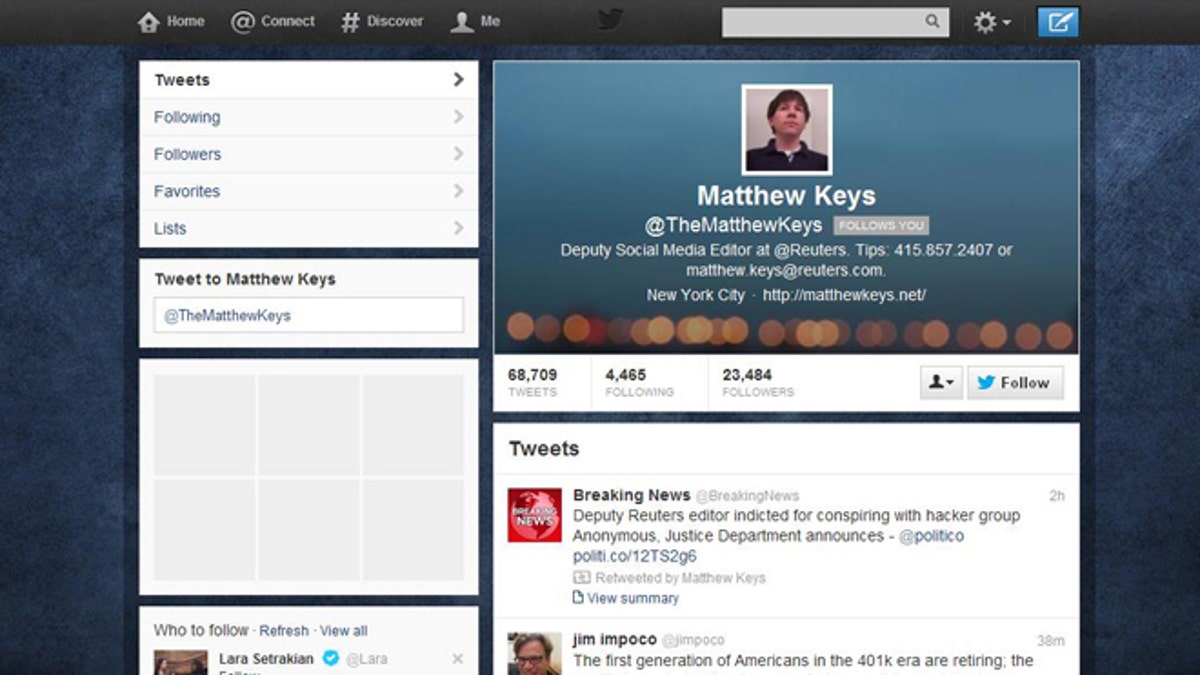
This screengrab taken on March 14, 2013 shows the Twitter account of Matthew Keys. At the top of the page is a retweet of a story detailing Keys' indictment.
SAN FRANCISCO – U.S. prosecutors say a journalist conspired with the hacking group Anonymous to cause an online security breach that should be punished by decades in prison. But online supporters of Matthew Keys say he was just taking part in a prank that briefly altered the Los Angeles Times' website and shouldn't be treated so harshly.
The case against Keys, 26, lays bare sharp divisions about what constitutes Internet crime and how far governments should go to stop it.
"Congress wants harsh penalties doled out for these crimes because they don't want people defacing websites, but there has to be a way that we can bring the law into harmony with the realities of how people use technology today," said Hanni Fakhoury, an attorney at the nonprofit Electronic Frontier Foundation.
Keys, now a deputy social media editor for Reuters, was charged Thursday with conspiring with Anonymous to alter a Times news story in late 2010.
The federal indictment accuses Keys of giving hackers the information they needed to access the computer system of Times' parent company, Tribune Co. Tribune also owns a California television station Keys had been fired from months earlier.
An attorney for Keys said he is not guilty, and that the government is overreaching in its zeal to prosecute Internet pranks.
"No one was hurt, there were no lasting injuries, no one's identify was stolen, lives weren't ruined," Jay Leiderman said Friday. "Mr. Keys was no different than any other embedded journalist. The story he was going after was inside this chat room, and he went there."
Keys didn't return a phone call seeking comment.
"I'm okay," he tweeted Friday in response to a journalism colleague wondering how he was doing.
Keys was suspended with pay late Thursday, said Reuters spokesman David Girardin, who did not elaborate. A spokesman for Tribune Co. declined to comment.
According to the indictment, a hacker identified only as "Sharpie" used information Keys supplied in an Internet chat room and altered a headline on a December 2010 Times story to read "Pressure builds in House to elect CHIPPY 1337." The reference was to another hacking group credited with defacing the website of video game publisher Eidos in 2011.
Keys is charged with one count each of conspiracy to transmit information to damage a protected computer, as well as transmitting and attempting to transmit that information. If convicted, prosecutors say he faces a combined 25 years prison and a $500,000 fine if sentenced to the maximum for each count.
However, first-time offenders with no criminal history will typically spend much less time in prison than the maximum sentence, said Mary Fan, a former federal prosecutor who specializes in criminal law and procedure at the University of Washington School of Law.
Keys' arraignment is scheduled for April 12.
Anonymous and its offshoot, Lulz Security, have been linked to a number of high-profile computer attacks and crimes, including many that were meant to embarrass governments, federal agencies and corporate giants. They have been connected to attacks that took data from FBI partner organization InfraGard, and they've jammed websites of the CIA and the Public Broadcasting Service.
Keys' indictment comes after recent hacks into the computer systems of two other U.S. media companies that own The New York Times and The Wall Street Journal. Both newspapers reported in February that their computer systems had been infiltrated by China-based hackers, likely to monitor media coverage the Chinese government deems important.
The hacking crimes Keys is charged with come from the Computer Fraud and Abuse Act, which was enacted in the 1980s.
Federal prosecutors use the act to go after a wide range of Internet crimes, but the law may not reflect how our behavior online has changed over the last three decades, Fan said.
"Some might say if you take someone's property or break into a private place without permission, we don't get upset about prosecutions, so why would we be upset about these prosecutions if the trespass happened online?" Fan said. "Others might say is what happened in this case really even a problem? It's kind of a culture clash."




















